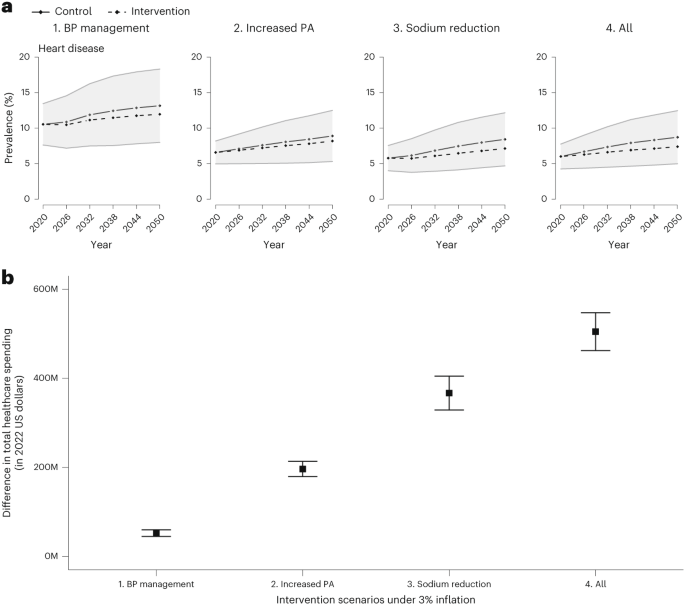Better health for your whole body can be broken down into just seven factors, according to a new study.
Life’s Simple 7 is the American Heart Association’s guidelines for achieving and maintaining ideal cardiovascular health. The factors include not smoking, a nutritious diet, regular exercise, a healthy weight, optimal blood pressure, controlled blood sugar and well-managed cholesterol.
Researchers reviewed 483 studies on the impacts of maximizing Life’s Simple 7 on the health of many different body systems over the course of people’s lives in a meta-analysis published Wednesday in the Journal of the American Heart Association.
Maintaining ideal levels of at least three of Life’s Simple 7 metrics was associated with a lower risk of cardiovascular disease, even if someone had a genetic predisposition, according to the data. And better scores across all of the factors showed benefits in many body systems beyond cardiovascular health.
“A few years ago, we learned that heart health and brain health are very closely tied. Through this review, we found that almost every organ system and bodily function also benefits from maintaining the healthy lifestyle behaviors of Life’s Simple 7,” said lead study author Dr. Liliana Aguayo, a research assistant professor at the Nell Hodgson Woodruff School of Nursing and the Global Diabetes Research Center at Emory University in Atlanta, in a statement.
“We were pleasantly surprised to find that Life’s Simple 7 at optimal levels touched every aspect of health, from head to toe. It goes well beyond just cardiovascular health to encompass whole-body health,” she added.
The researchers conducted a systemic review of studies that followed a gold standard approach, said Dr. Nour Makarem, assistant professor of epidemiology and co-leader of the Chronic Disease Unit at the Columbia University Mailman School of Public Health in New York City. Makarem was not involved in the research.
One of the most significant findings of the research is that a little change makes a big difference when it comes to lifestyle and health, Aguayo said.
The study assessed adherence to Life’s Simple 7 using a scale from 0 to 14 points.
Each improvement by 1 point was associated with an 11% decrease in dementia risk, a 6% decreased risk of eye disease, a 23% decreased risk of fatty liver disease, and an 11% decreased risk of chronic kidney disease, Aguayo said.
“This means that small changes, for example, moving from obesity to overweight, adding any physical activity even if below recommended levels counted as progress,” she said.
Many of the studies showed an adherence to Life’s Simple 7 was associated with maintaining brain and lung function, vision and hearing, and teeth and muscle strength over the course of aging, according to the data.
The studies included in the meta-analysis used Life’s Simple 7 to evaluate lifestyle behaviors, but the AHA has since updated the metrics to Life’s Essential 8.
The new guidelines are more comprehensive, such as including avoiding secondhand smoke, vaping and nicotine products in the not smoking factor and pointing people to the Mediterranean diet or DASH diet under the healthy eating metric, Makarem said. DASH stands for Dietary Approaches to Stop Hypertension; high blood pressure is a major contributor to heart disease and stroke.
Importantly, the update added an eighth metric that recognizes the role of sleep in long-term health, he added.
Good sleep means seven to nine hours a night for most adults, 10 to 16 hours for children ages 5 and younger, 9 to 12 hours for kids ages 6 to 12, and 8 to 10 hours for adolescents ages 13 to 18, according to the AHA.
The study confirms that adopting a healthy lifestyle is important to achieve optimal health as well as managing the conventional risk factors for cardiovascular disease –– weight, blood pressure, cholesterol and blood sugar, Aguayo said.

Everyday lifestyle choices have a big impact on overall health, and it’s worth it to take steps toward better cardiovascular health, Aguayo said.
“The key message is that it is never too early or too late to make small, feasible changes,” she said in an email. “Small improvements in diet, physical activity, smoking, or managing risk factors (weight, blood pressure, cholesterol and sugar) can have meaningful benefits, not just for heart health, but for all the body, from head to toe.”
For a heart-healthy diet, Makarem recommends focusing on plant-based foods such as fruits, vegetables, legumes and whole grains and consuming lean proteins such as fish. She also recommended limiting processed foods, sodium and sugar-sweetened beverages.
Adults should engage in 150 minutes of moderate physical activity — like walking, dancing or gardening — or 75 minutes of vigorous physical activity a week, Makarem added.
Even considering how impactful small changes can be, ideal cardiovascular health is very rare –– with less than 4% of people worldwide meeting the criteria, Aguayo said.
“We must do more to support young people, especially women, by making it easier, more affordable, and achievable for all to improve their cardiovascular health,” she added. “Cardiovascular disease is still the number one killer of women. Supporting the heart health of young people and women is both cost-effective and the right thing to do.”
Sign up for CNN’s Fitness, But Better newsletter series. Our seven-part guide will help you ease into a healthy routine, backed by experts.


